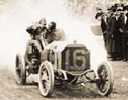Russell's Ramblings
by Russell Jaslow
The Castration of Tony George
6/5/09
Rochester, N.Y.—Perhaps the final chapter has started in the world of American open wheel racing. Though no one knows for absolute certainty exactly what happened nor exactly what the situation is in the Hulman George boardroom, just about everyone is in agreement on one thing.
Tony George has been castrated.
His ability to endlessly fund the IRL with the profits from the Indianapolis Motor Speedway has apparently come to an end. With that spigot shutoff, so too may the IRL.
The IRL has never shown a profit, despite so many claims to the contrary. All the railing on CART's latter years and during Champ Car's existence of their inability to make a profit did not negate the IRL's own impotence. $600 million shoveled down the 15-year-old sinkhole will leave the legacy of the worst business in sports history. As well as one of the most expensive subsidized rich man's play things in sports history.
Perhaps it's fitting George's castration was done by all women -- his three sisters and mother (or did the sisters also gang up on their own mother?). To carry the analogy even further, eunuchs were created to ensure the guards did not soil the princess they were protecting. Well, the sisters turned their brother into a eunuch to ensure he no longer soils what he was supposed to be protecting -- the Speedway and in extension their trust fund.
Now what? Is open wheel racing now heading for the scrap heap of history, as one message board poster put it? Sports that were once extremely popular, some for very long periods of time, are now totally gone or virtually eliminated from the public's consciousness: harness racing, six-day bicycle races, legitimate roller derby, a true heavyweight boxing titleholder. What will become of this nuclear wasteland called open wheel racing?
The state of the sport is so dire, it is hard to imagine anyone stepping up to fund it. Even if they truly believe there is a profitable future if run correctly, it will still entail a massive investment. However, let's take the approach that if there is a void, something will fill it. Even if the void is so huge. After all, when it looked like big time American sports car racing was all but dead, out of the ashes came not one, but two major sports car endurance series.
I foresee three possible scenarios for the resurrection of American open wheel racing. One would be a nightmare perhaps worse than the IRL. The other will be like witnessing déjà vu all over again. The third solution would be the ideal one.
The Nightmare. NASCAR takes over, either by forming a whole new series from scratch or buying out whatever assets are left of the IRL when Tony George has to throw in the towel. They won't do this to ensure the burial of open wheel racing nor to kill the Indy 500 as an open wheel race and move the Brickyard 400 to May and call it the Indy 500. If they were to do this, it would be to add an open wheel division to their racing empire just as they have a sports car division (Grand Am) and motorcycle division (AMA).
Plus, this will enable them to expand out into the one area they cannot do with their stock cars and can't really do alone with the Grand Am -- enter the lucrative street racing business. Sure, more street races have failed than succeeded, but with the proper choices and the proper markets, it can be very profitable. Places like Long Beach, Cleveland, Toronto, and you can be sure that NASCAR will be smart enough to get Surfers Paradise back on the schedule with the huge sanctioning fee the Aussies were more than happy to pay. Then, throw in the profitable road courses here and abroad, and NASCAR opens a new market for themselves.
Speaking of international, an open wheel division is the one type of racing NASCAR can do what they have been unable to do with stock cars, aren't capable of doing with the Grand Am, and can't do with the AMA -- expand globally. In fact, doing so will open up new sponsor markets that generally won't compete with the sponsors their other racing divisions covet.
One has to wonder what the implications are to the Humpy Wheeler rumor to be the one taking over the CEO role for IMS.
This possibility is a nightmare for open wheel fans because it would combine the worst of both racing worlds -- ugly, uninspiring cars (i.e., Grand Am and IRL), spec series (i.e., IRL and Car of Tomorrow), secret rules (i.e., NASCAR), and a management style that most everyone in racing despises (see AMA competitors reactions the past six months).
Some of us may actually be pining for the days of the IRL...
Déjà Vu. The owners step up and form a series. Of course, we've seen this all before with CART, and though there were some wonderful growth spurts in the sport during this time, the split exposed the huge weakness of this form of racing management. The owners, generally speaking, are a very greedy, egotistical, untrustworthy, backstabbing lot, and when pressure is applied, they think only of themselves to the detriment of the sport as a whole.
Plus, owners don't like to spend their own money. Even Roger Penske spent very little of his own money when CART was first formed, providing a small loan to get it up and running. With Penske most likely tied down financially with the buyout of Saturn, this offer may not be available the second time around. It is hard to see Chip Ganassi or Michael Andretti (especially Michael!), offering up any of their own money. Combine that with most of the owners used to receiving handouts and subsidies, the idea of coming up with their own funds is quite ludicrous.
If however, they were able to do this, the series would probably be a bit better than the IRL in terms of cars and excitement but probably not as great as CART's heyday, and a bit better run than the IRL (though that's not saying much). The question is, if there are no other possibilities, will the owners attempt to do this to save the sport or donate their open wheel assets to museums and head off to sports cars and stock cars?
The Ideal. The American Le Mans Series starts up an open wheel racing division perhaps with Ben Johnston involved. Though the ALMS was originally funded by billionaire Don Panoz, it is by all accounts a self sufficient series. It has close ties to many of the car, engine, and tire manufacturers from around the world, has the sort of sponsors that cater to the clientele that used to embrace CART, and is just as capable of being a headline event as it is playing double billing with another series.
The ALMS is also the most forward looking series when it comes to alternate energy sources, even more so than Formula 1. The leaders of ALMS have been able to position this series as the most relevant racing series in America (even gaining the backing of the Department of Energy), if not the world, at a time when some politicians are questioning the relevance of auto racing.
Being linked into the 24 Hours of Le Mans and the ACO has been both a blessing and a curse. The blessing is that the series gained instant credibility, and like the IRL's lure of the Indy 500, the ALMS can offer their competitors not only the lure of Le Mans, but guaranteed starting spots.
However, they are saddled with being beholden to a European, or more accurately, French rules making organization without the ability to tweak the regulations to suit the nuances of American racing and economy. Yet, despite this issue as well as the issue of the ALMS strengths being its greatest weaknesses (heavy reliance on manufacturers) during a down economy, ALMS has been able to keep the series above water during these hard times.
The ALMS just might be the best managed racing series in America. Imagine what that sort of forward thinking can do to open wheel racing. It can produce a credible, meaningful, technically advanced (but not too advanced) racing series right in line with the ALMS philosophy.
ALMS can grow it to be able to stand on its own at certain events while making a perfect partner to the sports cars at other events. Plus, ALMS would have no issue with finding and funding international venues thanks to their connections with global manufacturers and sponsors. And the ALMS plays no favorites, as they famously proved when they ignored Penske's constant suggestions and complaints, even to the detriment of seeing Penske leave the series.
Plus, Panoz owns Elan Motorsport Technologies, makers of the DP01. Even if parts of Elan are up for sale, I'm sure, if necessary, Panoz can make the arrangements for the development and production of new cars befit of the type of open wheel series the ALMS would want to put on.
If they want to. And that will be the ultimate question asked throughout the racing world. Will anyone want to fill the open wheel void of the inevitable collapse of the IRL now that Tony George has been castrated?
Copyright © 2009 by and Deep Throttle. All Rights Reserved.
Russell's Ramblings Archive
| 



